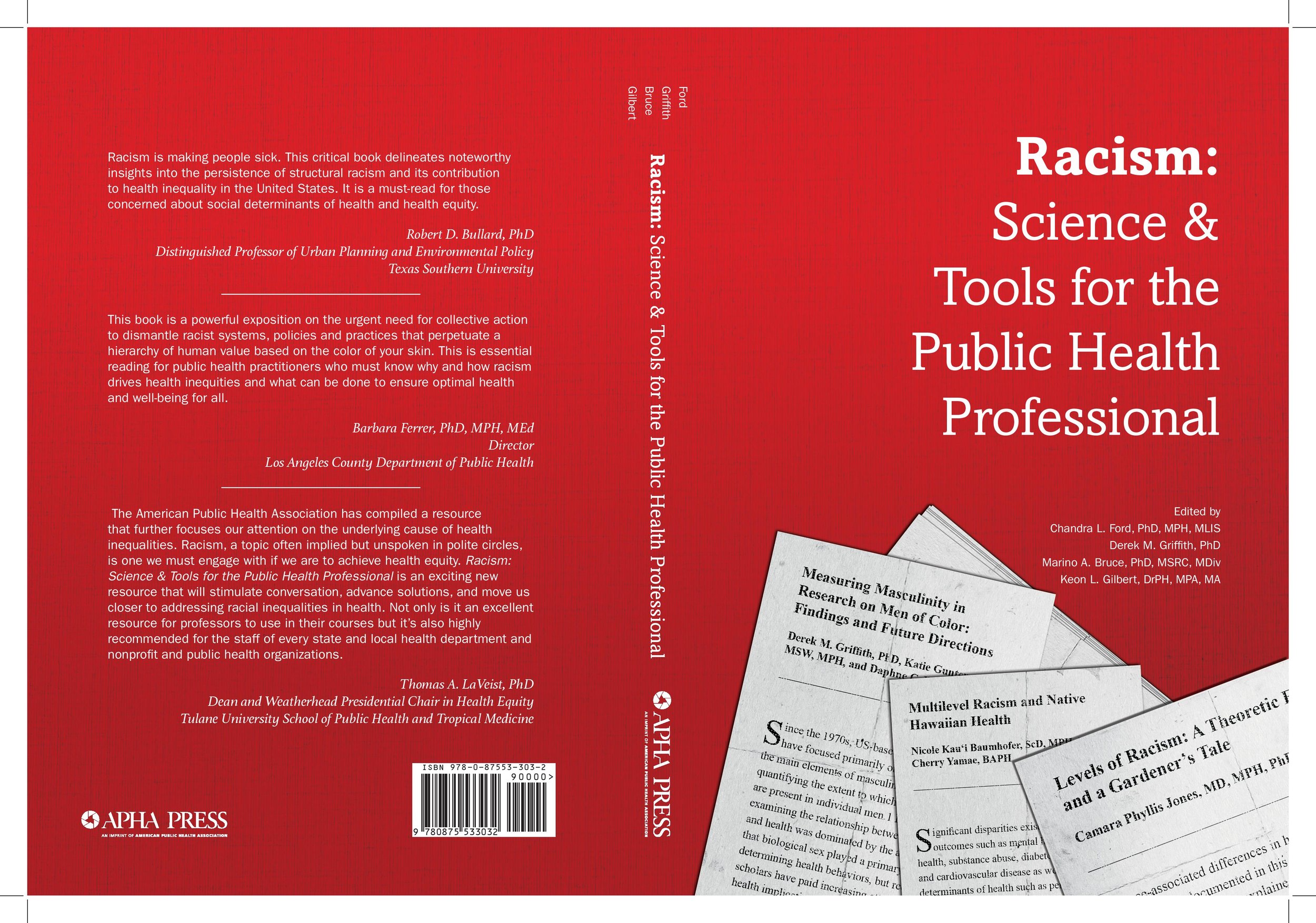Racism: Science & Tools for the Public Health Professional
Edited by
Chandra L. Ford, PhD
Derek M. Griffith, PhD
Marino A. Bruce, PhD and
Keon L. Gilbert, DrPH
This important publication builds on the racial health equity work that public health advocates and others have been doing for decades. They have documented the existence of health inequities and have combatted health inequities stemming from racism. This book, which targets racism directly and includes the word squarely in its title, marks an important shift in the field’s antiracism struggle for racial health equity. It is intended for use in a wide range of settings including health departments, schools, and in the private, public, and nonprofit sectors where public health professionals work. It will also benefit students still in training and will also serve as a practical reference text for courses and workshops.
Place orders at aphabookstore.org. Email bookstoreseservices@apha.org to request an exam copy for classroom use.
TABLE OF CONTENTS
Foreword: An APHA Perspective
Camara Phyllis Jones
Foreword: The Long Trajectory
William C. Jenkins
Preface
Acknowledgements
1. Introduction
Chandra L. Ford, Derek M. Griffith, Marino A. Bruce, and Keon L. Gilbert
I. IS RACISM A PUBLIC HEALTH ISSUE?
2. Overcoming the Impact of Racism on the Health of Communities: What We Have Learned and What We Have Not
William C. Jenkins, Victor J. Schoenbach, and Diane L. Rowley, and Chandra L. Ford
Appendix 2A. Historical files and photographs
3. “We just haven’t put our minds to it”: An Interview with David Williams Describing the Trajectory of his Career Studying Racism
David R. Williams with Derek M. Griffith
4. A Call for Leadership in Tackling Systemic and Structural Racism in the Academy
Collins O. Airhihenbuwa and Juliet I. Iwelunmor
A Note From the Battlefield
Loretta Jones with Chandra L. Ford
II. HOW DOES RACISM AFFECT HEALTH?
Structural Mechanisms
5. Black–White Health Inequalities by Intentional Design: The Lasting Health Impact of racial residential segregation
Margaret T. Hicken, Lindsey Burnside, Dominique L. Edwards, and Hedwig Lee
6. Structural Racism in Policing and Mass Incarceration: A Driver of Health Disparities in Black and Latino/Latina Communities
Sharon G.E. Washington and Robert E. Fullilove
7. Critical Race Theory, Racial Stratification in Education, and Public Health
Alma Itzé Flores, Tanya J. Gaxiola Serrano, and Daniel G. Solórzano
Interpersonal and Individual Level Mechanisms
8. John Henryism, Structural Racism, and Cardiovascular Health Risks in Black Americans
Sherman A. James
9. The Burden of Cultural Racism: Vigilance and Racial Health Inequalities
Margaret T. Hicken, Alexis G. Stanton, and Hedwig Lee
10. Racism Across the Life Course
Roland J. Thorpe, Jr., Keith C. Norris, Bettina M. Beech, and Marino A. Bruce
Action and Allegories
11. Action and Allegories
Camara P. Jones
III. WHAT DO WE DO?
A Note From the Battlefield
Loretta F. Jones with Chandra L. Ford
12. Epidemiology: Why Epidemiologists Must Reckon With Racism
Nancy Krieger
13. Scientific Literacy: An Opportunity For Meaningful Engagement of Minority Communities in Public Health Research
Melody S. Goodman and Vetta Sanders Thompson
14. Health Care: Antiracism Organizing for Culture and Institutional Change in Cancer Care
Kristin Z. Black, Stephanie L. Baker,Linda B. Robertson, Alexandra F. Lightfoot, Kimberly M. Alexander-Bratcher, Deanna Befus, Carol Cothern, Crystal E. Dixon, Katrina R. Ellis, Fatima Guerrab, Jennifer C. Schaal, Beth Simon, Beth Smith, Kari Thatcher, Sonja M. Wilson, Christina M. Yongue, and Eugenia Eng
Appendix 14A. HEET Evaluation Survey
Appendix 14B. HEET Observation Tool
Appendix 14C. HEET Debriefing Questions for Facilitators and Observers
15. Organizing: What Do White People Need to Know to Be Effective Anti-Racism Allies Within Public Health?
Jen Margaret and Heather Came
16. Critical Race Theory’s Anti-Racism Approaches: Moving From the Ivory Tower to the Frontlines of Public Health
Chandra L. Ford and Kia Skrine Jeffers
A Note From the Battlefield
Loretta Jones with Chandra L. Ford
IV. ARE THERE GROUP-SPECIFIC EXPERIENCES?
A Note From the Battlefield
Loretta Jones with Chandra L. Ford
17. Hate crimes in the United States
Chandra L. Ford
18. “We Are Peoples”: Reclaiming Native Health
Dian Million and Dornell Pete
19. Multilevel racism and Native Hawaiian health
N. Kau’i Baumhofer and Cherry Yamane
20. The global and historical nature of racism and health among Asian Americans
Gilbert C. Gee, Cindy C. Sangalang, Brittany N. Morey, and Anna K. Hing
21. Racism and the health of Latina/Latino communities
Alana M.W. LeBrón and Edna A. Viruell-Fuentes
22. How racism has shaped the health of Black Americans and what to do about it
Darrell L. Hudson
23. Racialization of religious minorities
Goleen Samari, Héctor E. Alcalá, and Mienah Z. Sharif
V. WHERE DO WE GO FROM HERE?
A Note from the Battlefield
Felica Jones
24. Toward a comprehensive understanding of racism and health inequities: a multi-level approach
Brian D. Smedley
25. Conclusion
Marino A. Bruce, Chandra L. Ford, Derek M. Griffith, and Keon L. Gilbert
VI. APPENDICES
Appendix A. Three Examples of Community-Based, Anti-Racism Projects
Natalie J. Bradford
Appendix B. Selected Measures of Racism
Rebekah Israel Cross
Appendix C. Annotated Resource List
Natalie J. Bradford
Appendix Glossary
Adrian M. Bacong, Attallah S. Dillard, and Natalie J. Bradford
Contributors
Index
Co-editors with APHA Executive Director at the APHA 2018 Annual Meeting. Left to right, Derek M. Griffith (Vanderbilt University Center for Research on Men’s Health), Keon Gilbert (St. Louis Univ.), Georges Benjamin (APHA), Chandra Ford (UCLA Center for the Study of Racism, Social Justice & Health), Natalie Bradford (graduate student researcher) and Marino Bruce (Vanderbilt University Center for Research on Men’s Health and Jackson State University).




